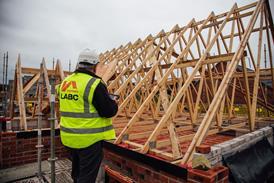The House of Lords has just decided a case that’s been around long enough to acquire its own nickname. And although it’s about a huge shipping dispute, it will have a big impact on construction
There is a real chance that a House of Lords case will tidy up a nuisance point for everyday adjudication. True, the case is about arbitration, not adjudication and true, the case is about a whopper of a dispute in the shipping world, but the ripples of relief are washing our building industry’s shore.
Let me explain. When a dispute is brought to arbitration, or to adjudication for that matter, it never surprises me to have one of the parties raise a devilish complication. In adjudication the statute confers the right to bring disputes “arising under the contract”. In arbitration, the arbitration clause will invariably say the same thing. The problem is the confounded phrase “disputes arising under the contract”. One of the bright spark parties will raise the objection that part of the dispute doesn’t; it only arises “in connection with the contract”.
Now, I don’t want to get overly complicated here, but disputes about building work or claims of professional incompetence are often brought “in contract” and also “in negligence”. The negligence is in connection with the contract. “You can’t bring that to an arbitration or adjudication,” says the objector. “The clause only talks about claims ‘under’ rather than claims ‘in connection with’.” This is meat and veg to the pernickety world of lawyers.

But the House of Lords has just given all that a very big heave-ho. The case is best known as “the Fiona”, but the name used in the House of Lords is Premium Nafta Products vs Fili Shipping. It’s a claim for hundreds of millions of dollars. It’s the sort of dispute that is ideally suited to commercial arbitrators, who know their shipping better than judges might do.
In any case, five judges in the House of Lords last week confirmed what three judges in the Court of Appeal said earlier this year: the use of the words “disputes arising under a contract” is wide enough to include disputes in connection with the contract. Mind you, there have been umpteen cases over the years that reached completely opposite results. We have been waiting all this time for some brave soul to bring the question to the House of Lords. Their decision now binds all tribunals of whatever hue.
What the learned judges have decided is that when a word or a phrase is used, it always has to be put into context
And joyous as I am, and clever as the explanation is, my guess is that these eight learned judges had half an eye on “policy” when reaching their conclusion. The policy eye is to do with stamping out delays. Taking a technical point at the outset of an arbitration, or a construction industry adjudication for that matter, can derail the whole process. That is not to say it is improper to put a spoke in the arbitration wheel. What it can do, though, is divert all eyes, all thoughts and all efforts to the
wheel in the ditch. In the Fiona, the arbitration was stopped a year ago while the debate about what could or could not come to the arbitrator went through three court cases. It took a year to get the wheel back on the rails. These incidents are legitimate “satellite” diversions. The courts and parliament are the only folk who can clarify these points.
So, what did the learned judges decide? Easy really; they said that when a word or phrase is used, it always has to be put in context. And if a commercial contract contains an arbitration clause saying an arbitrator rather than a judge will decide disputes “arising under a contract”, then give those words the meaning that commercial people would intend. The commercial people will have recognised that their contracts do occasionally give rise to disputes of all sorts. And they have chosen arbitration to resolve them. Commercial people would be hardly likely to intend that some of their disputes go to an arbitrator and others to court. Rational business people would intend that the same tribunal would decide any dispute arising out of the relationship into which they have entered, or purported to have entered. I said it was easy, didn’t I?
Then what of adjudication? Does this House of Lords case apply here? What did parliament intend? Well, I guess it intended to give the construction industry what its rational business people asked for. It neatly provides that adjudication deal with all disputes whether “under”, “in connection” or “arising out of” the contract. In short: the lot.
Postscript
Tony Bingham is a barrister and arbitrator


























No comments yet